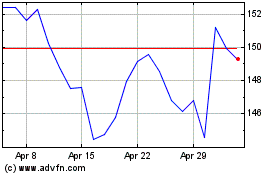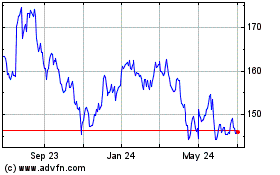J&J Pulled Into Court Fight -- WSJ
December 14 2018 - 3:02AM
Dow Jones News
At issue is how much freedom shareholders have to file lawsuits
against companies
By Dave Michaels
This article is being republished as part of our daily
reproduction of WSJ.com articles that also appeared in the U.S.
print edition of The Wall Street Journal (December 14, 2018).
WASHINGTON -- Johnson & Johnson Inc. is being drawn into a
battle over how much freedom shareholders have to sue companies, in
a bid by lawsuit opponents to force regulators to pick sides over
investors' access to the courts.
Hal Scott, a Harvard University professor who represents a trust
that owns J&J shares, filed a shareholder proposal with the
company that would push shareholder disputes into private
arbitration hearings, instead of federal court. J&J doesn't
want to bring the proposal up for a shareholder vote, and this week
the health-care products company asked the Securities and Exchange
Commission for permission to reject it.
Supporters of mandatory arbitration say it would save companies
money and time, arguing arbitration would be faster and less
expensive than grinding out federal lawsuits involving thousands of
investors. Proponents argue that class-action access to the courts
is vital for holding corporations and executives accountable to
shareholders.
"This is an important issue for the capital markets," Mr. Scott
said in an interview. "It affects whether private companies want to
go public, and whether foreign companies want to list [here]."
About 8.5% of all U.S. exchange-listed companies are projected
to be targets of class-action lawsuits in 2018, according to
Cornerstone Research, a litigation and economic consulting firm.
That is well above the 20-year average of 2.9%, Cornerstone
said.
Securities class-action lawsuits typically focus on claims that
public companies either misled investors about important facts or
events, or failed to disclose important information that would have
altered shareholders' investment decisions.
Much of the expense is born by existing shareholders, with other
shareholders sometimes benefiting from a settlement or judgment.
Research into whether such judgments deter future wrongdoing has
been inconclusive, said Donald Langevoort, a securities-law expert
at Georgetown University.
Mr. Scott is seeking to list his proposal for a bylaw change
that would require mandatory arbitration on J&J's 2019 proxy
statement. J&J shareholders would vote on the measure next
year.
J&J wrote the SEC this week asking permission to exclude the
proposal from its ballot. Forcing investors into arbitration would
violate parts of federal law that forbid asking investors to waive
their legal rights, J&J's attorneys wrote. The SEC rules every
year on whether companies can omit different shareholder proposals.
While public companies could benefit from arbitration, some fear it
would offend investors if they were to push too aggressively for
it.
A J&J spokesman declined comment beyond the company's
letter.
SEC Chairman Jay Clayton has said he wants to avoid a brawl over
mandatory arbitration that would pit business groups against
investors and likely splinter the five-member commission along
party lines.
Some Republican commissioners say arbitration should be given a
shot if stockholders agree with it.
"As far as I can see, the SEC does not have statutory grounds to
substitute its judgment for that of shareholders and the companies
they own," Commissioner Hester Peirce, a Republican member, said in
September.
Robert Jackson Jr., a Democratic commissioner, said in February
that curbs on shareholder lawsuits should be debated only through a
federal rulemaking process. That would allow for analysis by the
agency's economists and lawyers as well as public comments from
investors and companies.
The speedy nature of arbitration probably isn't well suited to
sorting out allegations of market fraud, Mr. Langevoort said.
Federal courts allow both sides to take depositions, determine
witnesses' credibility, and draw on outside experts. "Arbitration
is not really meant for that," he said.
Another downside is that arbitration is private, said Hillary
Sale, also a law professor at Georgetown University.
"We won't have a good understanding of when companies are
committing fraud or in fact behaving in an above-board manner," Ms.
Sale said.
Mr. Scott said mandatory arbitration wouldn't dilute
shareholders' rights, and would only affect where a dispute is
heard, and not whether shareholders can mount a claim.
"All the SEC should decide is the legality of doing this under
federal law," he said.
If the commission decides the proposal can go before J&J's
stockholders, "the roadblock has been lifted," Mr. Scott added.
"Then a number of companies could do this."
Write to Dave Michaels at dave.michaels@wsj.com
(END) Dow Jones Newswires
December 14, 2018 02:47 ET (07:47 GMT)
Copyright (c) 2018 Dow Jones & Company, Inc.
Johnson and Johnson (NYSE:JNJ)
Historical Stock Chart
From Mar 2024 to Apr 2024

Johnson and Johnson (NYSE:JNJ)
Historical Stock Chart
From Apr 2023 to Apr 2024
